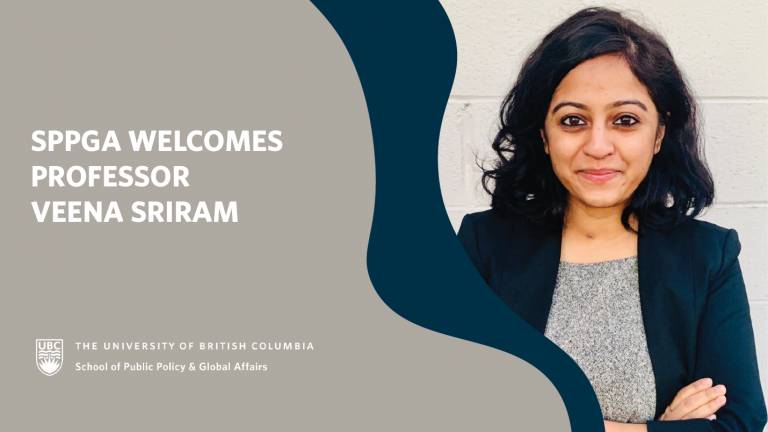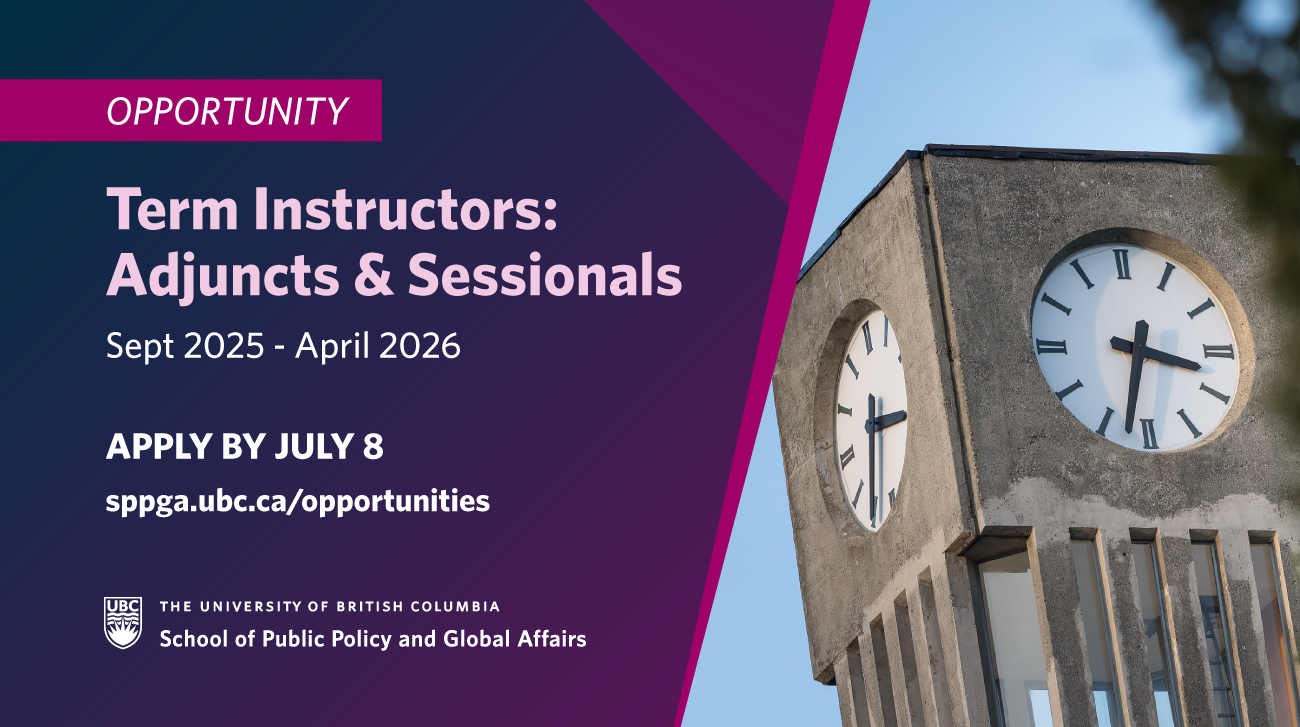

The School of Public Policy and Global Affairs (SPPGA) welcomes Dr. Veena Sriram, who is jointly appointed with the UBC School of Population and Public Health (SPPH). Dr. Sriram is Assistant Professor of Global Health Policy. Her research focuses on understanding the role of power and politics within health policy processes in low- and middle-income countries. Learn more about her by visiting her SPPGA profile.
We spoke to Professor Sriram to learn more about her work and her engagement with MPPGA students and the school.
SPPGA: You’re an expert in global health policy. What drives your research?
My upbringing in Chennai, India within a family of medical professionals sparked an interest in understanding and addressing the drivers of health inequity. Due to my privilege and background, the health services that I was able to utilize was far removed from what the vast majority of Indians could access, and I was committed to being part of the effort to address those disparities.
During various research projects in India, Pakistan and Ghana, I developed a deep interest in understanding systemic approaches to addressing health challenges. A barrier that repeatedly emerged was the fact that the policy process did not contribute to sustainable change. I was very curious about why that is – what are the obstacles? What are the power imbalances within these various policymaking ecosystems that enable or block change? How do these processes interact with the broader political environment? How and why have these policymaking bodies, such as health authorities or regulatory agencies, developed in these particular ways? What is the role of colonialism and other historical processes? I was keen to conduct research that unpacks these ‘black boxes’ and work in partnership to contribute solutions.
What ultimately drives my research is the belief that we need more transparent, inclusive and equity-oriented processes to develop health policy globally – this has been underscored during COVID-19 across all contexts. COVID-19 has also cemented my commitment to addressing the policy-level drivers of health inequities in low- and middle-income countries, and in Canada and other high-income country contexts.
SPPGA: What are you working on currently?
Some of my current projects include collaborating on a study exploring the response of the private health sector to COVID-19 in India, and a gradual engagement with efforts here at UBC to understand the political, organizational, institutional and governance factors impacting the COVID-19 response in a variety of international contexts. I am also working with colleagues to develop an analytic framework for studying the politics of health provider associations in low- and middle-income countries.
Looking ahead, I am working on developing a research portfolio that examines four topics in the context of low- and middle-income countries– 1) the generation of political priority for medical specialties; 2) health workforce regulation, particularly the functioning of professional regulatory bodies; and 3) the politics of health provider associations; and 4) governance processes related to national- and state-level health authorities.
SPPGA: What is on the horizon in terms of major breakthroughs or trends in global health policy?
COVID-19 has reframed how we view global health – including by turning on its head that the traditional presumptions of high-income countries having the answers and low- and middle-income countries being the recipients of knowledge and aid. Those views were deeply problematic to begin with, but have rightly warranted more scrutiny during the pandemic. So I think we will start to see less of a focus on global health as being about low- and middle-income countries, and more of a truly global focus where the emphasis is on inequities regardless of context.
Due to what we are experiencing now, there will likely be a surge in investments around health emergencies – there is clearly a ‘nationalistic’ approach taking place, but what is to be seen is how global coordination will change and if/how the WHO will be further empowered. It will also be important to watch whether a systems lens is applied to these investments, in order to ensure that these changes build and strengthen existing systems. I also hope that we see more attention to seeing health as closely intertwined with other social sectors – this has also proven to be a major aspect of COVID-19 and I hope there will be more research and investment into cross-sectoral approaches to health and wellness.
COVID has also shown us the critical importance of politics and governance, and the need to have evidence-driven, transparent and inclusive processes. Many in global health have long called for interdisciplinary thinking and drawing upon the social sciences in global health research and practice, and I think we will see an acceleration of efforts in that direction.
Finally and most importantly, there is growing recognition of the colonial underpinnings of global health and the need to decolonize global health – and as a result there will hopefully be a shifting dynamic where researchers based in LMICs drive the research agenda, and colleagues in high-income countries work in solidarity as allies.
SPPGA: What are you most excited about in terms of joining SPPGA?
I’m truly excited by the diversity of interests, contexts and backgrounds represented here at the school, and I’m looking forward to thinking together with faculty and students about the numerous intersections with global health. I am also appointed at the School of Population and Public Health here at UBC, and hope to be part of the bridging of expertise between the schools. Much of my work has been in India, so it’s also terrific to join an academic center with so much expertise and experience in Asia. SPPGA and UBC more broadly are also committed to promoting change through research, policy engagement and education, and I am excited to be part of a community that embodies these values.
I have also been fortunate to have wonderful female mentors who have helped me navigate academia as a woman and a mom of two young children, and I’m very excited to learn from and contribute to this vibrant community of female researchers and students here at SPPGA.
SPPGA: What do you think students interested in global health policy should know?
Global health policy is a fascinating and complex aspect of development. Our current moment has shown us just how layered and multidimensional these issues are, and also how it impacts each and every one of us. Engaging with global health policy shows how so many factors – history, politics, science, culture and society, economics – come together to influence access to a basic human right – the right to health. There are enormous health and social inequities within and across countries, and having a firm sense of how we got to this point and the current context – in terms of colonialism, politics and other aspects of power – is essential for taking a considered, ethical approach to how to engage in this field and how to work in equitable partnership with colleagues working in these contexts.


